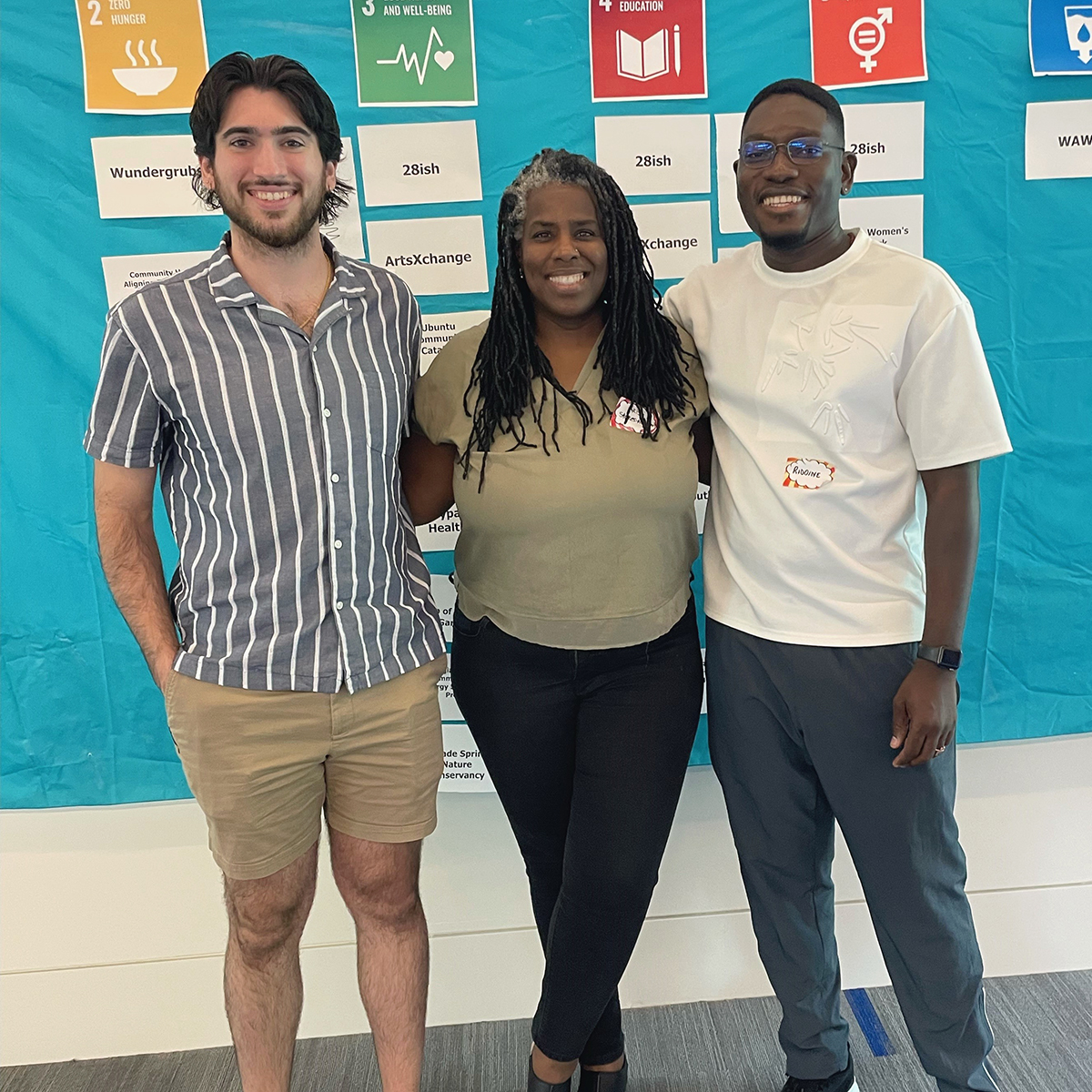Energy and National Security - Lunch and Learn 3
Building on the Energy and National Security Initiative launched by the Strategic Energy Institute and GTRI in July 2024, this Lunch and Learn series features three focused sessions designed to spark dialogue around regional, national, and global energy-security priorities. Each session will bring together a diverse mix of internal and external stakeholders.
Energy and National Security - Lunch and Learn 2
Building on the Energy and National Security Initiative launched by the Strategic Energy Institute and GTRI in July 2024, this Lunch and Learn series features three focused sessions designed to spark dialogue around regional, national, and global energy-security priorities. Each session will bring together a diverse mix of internal and external stakeholders.
Energy and National Security - Lunch and Learn 1
Building on the Energy and National Security Initiative launched by the Strategic Energy Institute and GTRI in July 2024, this Lunch and Learn series features three focused sessions designed to spark dialogue around regional, national, and global energy-security priorities. Each session will bring together a diverse mix of internal and external stakeholders.
Strategic Energy Institute and EPIcenter Announce Graduate Student Fellowships
Aug 15, 2025 — Atlanta, GA
The Strategic Energy Institute and the Energy Policy and Innovation Center at Georgia Tech are pleased to announce that applications are now open for two graduate student fellowships this fall.
The James G. Campbell Fellowship is designed to support Georgia Tech graduate students conducting research in the field of renewable energy and provides a $1,500 award.
The annual SPARK award is given to current Georgia Tech graduate students who have demonstrated outstanding leadership in advancing student engagement with energy research and with evidence of broader impacts and service or leadership. The number of SPARK awards is variable, depending on funding.
To be eligible, student applicants must be U.S. citizens or permanent residents and currently writing a thesis or dissertation focused on renewable energy.
The application deadline is Sept. 4, 2025.
Applicants must submit the following materials to the Energy Comments Mailbox of the Strategic Energy Institute:
- A brief cover letter (one to two paragraphs) explaining their motivation for studying their academic discipline and what they hope to accomplish in the field.
- Their full name, GTID number, anticipated graduation date, and field of research.
- A current resume.
- In addition, a one-page letter of nomination from a faculty member must be submitted separately to the same mailbox. Graduate students are strongly encouraged to begin the process of securing this nomination letter as early as possible.
These fellowships offer a valuable opportunity to gain recognition and support for work in renewable energy. All eligible graduate students are encouraged to apply and take the next step in advancing their academic and professional goals.
Priya Devarajan || SEI Communications Program Manager
Wind intermittency and supply-demand imbalance: Evidence from U.S. regional power markets
Aug 14, 2025 — Atlanta, GA

A Georgia Tech study examines how short-term variability in wind power—known as wind intermittency—affects real-time electricity system imbalances in U.S. regional power markets.
This study examines how short-term variability in wind power—known as wind intermittency—affects real-time electricity system imbalances in U.S. regional power markets. The authors, Victoria Godwin and Matthew E. Oliver of the Georgia Institute of Technology and EPIcenter affiliates, analyze data from four major system operators: Bonneville Power Administration (BPA), New York ISO (NYISO), Southwest Power Pool (SPP), and PJM Interconnection. They focus on Area Control Error (ACE), a real-time metric used by grid operators to measure the mismatch between electricity supply and demand, adjusted for frequency deviations. Maintaining ACE near zero is essential for grid stability.
The authors find that a doubling of hourly wind generation variance increases average hourly ACE by 2% in BPA, 3.7% in NYISO, and 11.4% in SPP—equivalent to 1.2 MW, 1.8 MW, and 9.35 MW increases in system imbalance, respectively. PJM shows no significant effect, likely due to less granular data. They also show that sudden increases in wind generation are more likely to cause oversupply (positive ACE), while sudden drops lead to undersupply (negative ACE), confirming asymmetric operational impacts.
Read Full Story on the EPIcenter Website
Priya Devarajan | Strategic Energy Institute
Farming for the Future of the Planet: How Liming Could Be Key for Carbon Removal
Aug 19, 2025 —

A tractor applying lime to mitigate acidity in the soil. [Adobe Stock]
Overly acidic soils can mean the difference between feeding a region and famine. Each crop needs the right soil pH to thrive, and acidic conditions, produced primarily by industrial emissions and application of fertilizers, can harm growing conditions. It has recently been estimated that sub-Saharan Africa, for example, loses billions of dollars annually in crop yield because of poor agricultural conditions. But there is a possible solution — and it could even help the Earth’s climate.
For centuries, farmers have neutralized soil acidity with a practice called liming. It involves mixing crushed calcium- or magnesium-rich rocks, known as limestone, into the soil to balance pH. But liming has long been an assumed tradeoff in which removing acid also meant increasing carbon emissions into the atmosphere.
New research from Georgia Tech shows that the opposite may be true. Agricultural liming can actually reduce atmospheric carbon dioxide and improve crop yield.
“The current thinking about liming is that farmers must choose between doing something that could benefit them economically or reducing their greenhouse gas emissions,” said Chris Reinhard, an associate professor in the School of Earth and Atmospheric Sciences. “But this is often a false choice. They can do both.”
The researchers published a new framework for the potential role of liming in food security and greenhouse gas mitigation in August in the paper, “Using Carbonates for Carbon Removal,” in Nature Water.
Collecting Carbon Data
The framework is based in part on ongoing work Reinhard and his collaborators are pursuing on the impacts of agricultural liming in the Upper Midwest’s Corn Belt for a Department of Energy study. With funding from the Grantham Foundation, they’re now turning their attention to local farms in southern Georgia and North Carolina.
For each farm, the researchers measure data that most farmers would collect already, like soil pH and nutrients. But the team also tracks more specialized measurements, including trace elements and greenhouse gas fluxes in the soil. All this data is matched to a high-resolution, machine learning grid of the farm’s geography to determine exactly which crops might benefit.
The researchers are using the data to build a computer model that predicts how carbon dioxide and other greenhouse gases will move through any particular soil system. Liming won’t universally absorb carbon dioxide — or if it does, there may be an occasional time delay between carbon emissions and absorption — which is why the researchers factor soil, crop rotation, climate, and other management practices into their calculations.
“Our goal is to develop a way that farmers can monitor and plan cheaply, and largely through techniques they are already using, so we don't have to send out a whole team to gather data,” Reinhard said. “We are trying to develop a predictive model architecture for planning agricultural practice across scales, but it’s important that the techniques required on the field are actually feasible for farmers.”
This data could be pivotal for farmers, and it could also help policymakers as they address farming subsidies and foreign aid funding. Globally, food-insecure regions like sub-Saharan Africa could become more self-sufficient with more liming. Farmers in parts of the U.S. could also improve their yields and, in effect, their profits, if they limed more fields.
The added benefit of lowering carbon could get even more farmers on board, and there is extensive exploration and implementation of agricultural practices already on voluntary and governmental carbon markets. Carbon dioxide is only one greenhouse gas that liming can lower; researchers are also exploring how liming can reduce methane and nitrous oxide — the latter of which is a key climate impact of human agriculture and is often considered a “hard-to-abate” emission.
Liming may be a centuries-old practice, but its applications are potentially much wider than initially believed. In the future, farming may be part of the answer to reducing carbon emissions, instead of part of the problem.
Tess Malone, Senior Research Writer/Editor
tess.malone@gatech.edu
Forest Expansion Increases Agricultural Output, New Study Shows
Aug 19, 2025 — Atlanta, GA

Agriculture is the largest cause of deforestation. So, it follows that forest expansion efforts would displace agriculture — but new research from Georgia Tech's School of Economics reports that that’s not necessarily the case. And not only that, forest expansion actually increased agricultural output in the study.
These findings can help governments, policymakers, and conservation organizations more accurately assess the costs and benefits of forest expansion projects in the fight against climate change.
“The key policy implication is that there may be co-benefits to using forest expansion as a tool to sequester carbon,” said Matthew E. Oliver, associate professor at the School of Economics and co-author on the paper. Without accounting for them, the net social benefits may be significantly underestimated, the researchers write.
The findings could also suggest alternative paths for aid organizations, Oliver said.
“Development programs don’t have to be in the form of direct aid. This project was about increasing forest areas, but it also supported the local economy in another indirect way.”
Main Findings
The paper, written by Oliver and Dylan Brewer at Georgia Tech and Vikrant K. Kamble at Muskingum University, was published in Land Economics. The project began as Kamble’s Ph.D. dissertation, on which Oliver and Brewer co-advised. They find:
- Following one of the largest forest expansion programs in Rajasthan, India, agricultural production in the area increased by 24% in the seven to 14 years after planting.
- The researchers hypothesize this could be due to increased pollinator activity in the newly forested areas and the 2% increase in rainfall they measured.
- While the 2% increase is statistically insignificant, yields for crops relying on rainfall grew considerably while yields for crops relying on irrigation did not, suggesting a connection between forest expansion, rainfall, and improved agricultural outputs.
This is some of the first evidence of its kind, and the researchers caution that the results may not hold true everywhere.
However, “our task was to rule out a negative impact on agriculture, and the fact that we're not seeing that and that there could be a positive impact is really strong evidence that we don't see a reverse trade-off,” Brewer said. “When you go back and reforest, it's not going to eat into agricultural resources.”
“Is There a Tradeoff between Forest Expansion and Agriculture?” was published in Land Economics in August 2025. Read more at https://doi.org/10.3368/le.101.3.022924-0020R
Ivan Allen College of Liberal Arts
Breaking the Rules to Build a Better Battery
Aug 18, 2025 — Atlanta, GA

An AI rendering of a rapidly charging battery. (Adobe Stock Image)
Fast charging a battery is supposed to be risky — a shortcut that leads to battery breakdown. But for a Georgia Tech team studying zinc-ion batteries, fast charging led to a breakthrough: It made the battery stronger. This result could revolutionize how we power homes, hospitals, and the grid.
By flipping a foundational belief in battery design, Hailong Chen, an associate professor in the George W. Woodruff School of Mechanical Engineering, and his team found that charging zinc-ion batteries at higher currents can make them last longer. The surprising result, recently published in Nature Communications, challenges core assumptions and offers a path toward safer, more affordable alternatives to lithium-ion technology.
Why Zinc-Ion Batteries?
Zinc-ion batteries have several key advantages over lithium-ion batteries, the most commonly used rechargeable battery technology:
- Abundant: Zinc is one of the most abundant metals on Earth, and it’s mined in many countries.
- Low cost: Zinc is significantly cheaper than lithium and doesn’t rely on scarce materials.
- Nonflammable: Unlike lithium, zinc batteries won’t catch fire — a critical safety benefit.
- Environmentally safer: Zinc is less toxic and easier to recycle than lithium-based materials.
However, until Chen’s discovery, zinc-ion batteries had one major drawback. The growth of dendrites, the sharp metal deposits that form during charging, can eventually short-circuit the battery.
“We found that using faster charging actually suppressed dendrite formation instead of accelerating it,” Chen said. “It’s a very different behavior than what we see in lithium-ion batteries.”
With this approach, the zinc doesn’t build up into dendrites. Instead, it settles into smooth, compact layers — more like neatly stacked books than splintered shards — a structure that not only avoids short circuits but also helps the battery last longer.
“It goes against the conventional thinking that fast charging shortens battery life,” Chen said. “What we found expands people’s understanding of fast charging that could rewrite how we think about battery design and where they can be used.
Solving Half of the Problem
Even breakthroughs have limits. Chen was quick to point out that while his discovery solves a major issue, it only fixes one half of the battery.
A battery has two main ends, the anode and the cathode. Chen’s team made the anode last much longer. Now, the cathode must catch up. He is working to improve the cathode so the whole battery performs reliably over time. His team is also experimenting with mixing zinc with other materials to make zinc-ion batteries even more durable.
Testing Everything at Once
Chen’s team didn’t just stumble on these results. They built a novel tool that allowed them to watch how zinc behaved under different charging rates in real time, studying many samples simultaneously.
That real-time, side-by-side view was important. Traditional battery experiments usually test one variable at a time. But this novel approach allowed researchers to test hundreds of conditions at the same time, speeding up discovery and revealing patterns that would have been easy to miss.
“We weren’t just seeing whether the battery worked or not; we were watching the structure of the material evolve as it charged,” Chen noted. Using their new tool, he and his team uncovered for the first time why fast charging makes zinc settle into smooth, tightly packed layers instead of dangerous, needle-like spikes. No one had ever experimentally mapped out this process before.
It’s an approach that combines efficiency with insight.
Charging Into the Future
Chen’s team didn’t reinvent the battery. They challenged the status quo — and the data took them somewhere no one imagined. That unexpected result could redefine battery science.
“You can imagine these zinc-ion batteries being used to store solar energy in homes, or for grid stabilization,” Chen said. “Anywhere you need reliable, affordable backup power.”
With growing demand for clean energy, unstable lithium supply chains, and safety concerns over flammable batteries, the need for alternatives has never been more urgent.
If all goes well, Chen hopes zinc-ion batteries could be ready for everyday use in about five years.
Chen’s research was supported by Yifan Ma, ME 2024; Josh Kasher, associate professor in the School of Materials Science and Engineering; and the U.S Department of Energy National Laboratories. The study was funded by Novelis through the Novelis–Georgia Tech Research Hub, with additional funding from the National Science Foundation. Two Novelis researchers, Minju Kang and John Carsley, are co-authors on the paper.
Michelle Azriel, Sr. Writer-Editor
mazriel3@gatech.edu
Georgia Tech Summer Interns Building Community Capacity
Aug 15, 2025 — Atlanta, GA

Georgia Tech intern Morgan Hale and Lifecyle Building Center Executive Director Shannon Goodman
Every summer for the last eight years, Georgia Tech students, from engineering and computer science to sustainable energy and environmental management, have lent their talents and creative energy to metro Atlanta sustainability-oriented organizations to increase their capacity in the community.
The Sustainable Communities Summer Internship Program in the Center for Sustainable Communities Research and Education (SCoRE) taps students from across the Institute, who gain real-world experience in both sustainability and community engagement, while participating partners scale their operations and deepen their relationship with Georgia Tech.
“It is a nontraditional internship, but it is so effective,” says Kristina Chatfield, director of business administration for the Brook Byers Institute for Sustainable Systems (BBISS), who manages the operational components of the program.
Impact on Atlanta’s Sustainability Community
Now in its eighth summer, the program has placed more than 200 students with over 60 Atlanta community organizations. Many return year after year, like WunderGrubs, an Atlanta-based insect farm that wants to bring a sustainable, nutritious form of protein to communities.
“I can’t overstate the value that Georgia Tech students bring to our company every summer through the SCoRE internship program,” says CEO and co-founder Akissi Stokes-Nelson, explaining that WunderGrubs’ mission is rooted in food equity and social impact. “We’re constantly innovating to support smallholder farmers, develop educational programs, and expand our reach both locally and globally. The SCoRE interns have been instrumental in helping us realize this vision.”
Stokes-Nelson says they add immediate capacity to WunderGrubs’ small team, bringing fresh perspectives and technical expertise — whether it’s developing new curricula for STEAM summer camps, introducing technology like Internet of Things (IoT) sensors and Arduino controllers, or helping the company build and scale its modular “grub shed” farming systems. She credits them with enabling her to reframe her business, pilot new programs, and even expand internationally, citing a recent partnership in Rwanda.
“What sets the Georgia Tech interns apart is their maturity, technical skill, and genuine passion for social impact. They’re not just here to learn — they’re here to contribute, innovate, and help us grow,” she says.
“The program is unique in its focus on both student development and organizational impact, particularly for underrepresented and first-generation students,” says Ruthie Yow, associate director of SCoRE, who leads partner engagement and student learning.
Georgia Tech covers all costs, including stipends for the full 12 weeks. Students take part in a seminar one evening a week to learn about grassroots sustainability innovation. They can also earn an internship course credit.
Connecting With Students in STEM
Intern Ridoine Idrissou, a computer science undergraduate at Tech, supported WunderGrubs’ “Tech Avengers” STEM summer camp. “We taught kids about cybersecurity, IoT, how to be safe online, and they learned about mealworms. They got rid of almost one ton of trash,” recalls Idrissou, who also developed IoT kits for the company’s farm sheds. “It’s not all about coding,” adds the Togo, West Africa, native. “It’s about connecting to the environment. It’s given me a whole different type of experience than I normally have as a computer science major.”
Idrissou, who has spent his last three summers interning, credits the program with giving him a chance when nobody else would. “My internship experience makes me appreciate the field I’m in, and it gives me a good idea of how to be mindful, when building software or other products, of the well-being of other people.” He plans to pursue a career in cybersecurity and system administration after he graduates next spring.
This positive internship experience isn’t the only one. Another organization benefiting from Georgia Tech’s talented students is the Lifecycle Building Center (LBC) in Atlanta.
Shannon Goodman, a Georgia Tech architecture program alumna, serves as executive director of the LBC. She considers her interns foundational to her nonprofit, which reduces waste in the built environment by salvaging materials like lumber, cabinets, flooring, and appliances, and making them available to the community, nonprofits, and for reuse in new projects. The organization runs a 70,000 square-foot warehouse and provides free materials and services to nonprofits across Atlanta.
“Our interns have been the connective tissue that helps all the different resource-constrained CEOs and community-based organizations build strong, trusted relationships with each other and lay the groundwork for our training program,” Goodman says.
Assessing the Lifecycle of Salvaged Building Materials
Morgan Hale interned at LBC while completing her graduate degree in sustainable energy and environmental management. “This internship program bridges sustainability with all the academic pathways at Georgia Tech. It does a great job of engaging students and educating them on ways to take what they're learning from school and map that into a career in sustainability,” says Hale, whose capstone project focused on the lifecycle assessment of salvaged building materials. “This internship perfectly aligned with my academic and career interests in sustainability and policy,” she adds. “And the extra workshops and networking opportunities are invaluable.”
For Goodman, education remains a key part of her team’s role. “Our job at the end of the day is helping people understand all the different types of opportunities that get lost when we just throw materials away. I don't know how we would do it without our interns. Through her capstone project, Morgan developed tools and procedures for calculating the embodied carbon and GHG emissions of the materials we salvage to create Environmental Product Declarations, or EPDs, for reclaimed materials, which don’t currently exist in the U.S. EPDs allow us to prove exactly how much better salvaged materials perform compared to new products, and will enable the material reuse industry to scale in the U.S. at a rate never seen before.”
LBC’s connection to Georgia Tech doesn’t stop with the internship program, however. “We have had countless professors from different departments of Georgia Tech bring their students here to learn about what we do, engage with us, and get materials from us,” says Goodman, noting that back in 2022, Georgia Tech was instrumental in helping her assemble community organizations like the West Atlanta Watershed Alliance and many others to form the ReBuildATL Coalition. Today, the coalition includes more than 40 nonprofits, academic institutions, industry partners, and local government agencies that empower Westside Atlanta neighborhoods.
Learn More
The Sustainable Communities Summer Internship Program is a partnership between SCoRE and the Office of Community-Based Learning. It is co-sponsored by the Brook Byers Institute for Sustainable Systems, the Strategic Energy Institute, the Renewable Bioproducts Institute, the Office of Commercialization, and the Sustainability Next initiative.
To learn more about the program, including how to contribute financially to the program or to become a participating partner, visit https://scre.research.gatech.edu/sustainable-communities-summer-internship-program.
By Anne Wainscott-Sargent

Left to right: Nathanael Sancinito, Akissi Stokes-Nelson, and Ridoine Idrissou at the SCoRE internship closing session.
Brent Verrill, Research Program Communications Manager, BBISS
Seashells Inspire a Better Way to Recycle Plastic
Aug 13, 2025 — Atlanta, GA

Researchers from Georgia Tech have created a material inspired by seashells to help improve the process of recycling plastics and make the resulting material more reliable.
The structures they created greatly reduced the variability of mechanical properties typically found in recycled plastic. Their product also maintained the performance of the original plastic materials.
The researchers said their bio-inspired design could help cut manufacturing costs of virgin packaging materials by nearly 50% and offer potential savings of hundreds of millions of dollars. And, because less than 10% of the 350 million tons of plastics produced each year is effectively recycled, the Georgia Tech approach could keep more plastic out of landfills.
Aerospace engineering assistant professor Christos Athanasiou led the study, which was published in the journal Proceedings of the National Academy of Sciences (PNAS).
Read the Q&A of the findings, and see a video of the testing, on the College of Engineering website.
Jason Maderer
College of Engineering
maderer@gatech.edu
